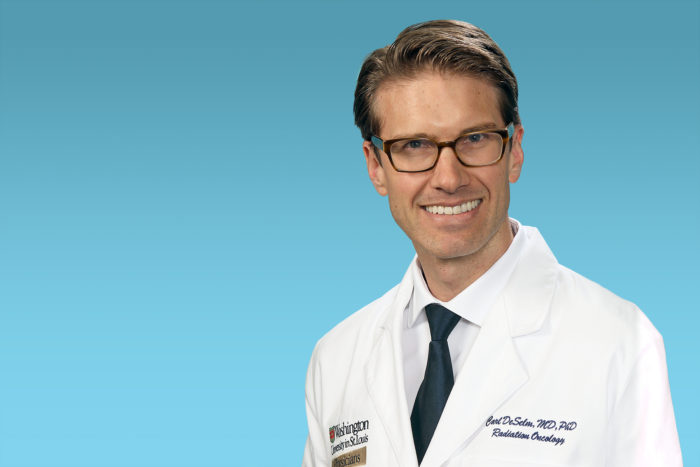DeSelm honored by NIH for innovative cancer research
Radiation oncologist selected for High-Risk, High-Reward Research Program
 Washington University
Washington UniversityCarl DeSelm, MD, PhD, has received the NIH Director’s Early Independence Award for his innovative cancer research.
Radiation oncologist Carl J. DeSelm, MD, PhD, has been honored by the National Institutes of Health (NIH) for his visionary research to harness the immune system to fight cancer.
DeSelm, an assistant professor of radiation oncology, is one of 89 researchers to be recognized by the NIH for innovative research as part of its High-Risk, High-Reward Research Program. The program supports high-risk ideas with high-impact potential and encourages exceptional creativity and thinking outside the box.
DeSelm will receive the NIH Director’s Early Independence Award. This year, the award provides $1.25 million over five years to each of 11 scientists from all fields around the nation doing unusually innovative work with the potential for broad impact in biomedical research fields. Established in 2011, the award supports exceptional junior faculty as they begin to build independent research labs.
DeSelm’s research is focused on a new type of immunotherapy for cancer called CAR-monocyte therapy. His interest lies in reprogramming these immune cells to specifically recognize and engulf tumor cells, and builds upon innovative work in the field of CAR T-cell therapy.
In CAR T-cell therapy, the patient’s own T-cells are removed from the body and trained to recognize cancer cells as targets. In other words, scientists give the cells a target to home in on and then return the trained cells to the patient. Once these CAR T-cells track down their prey, they behave like any killer T cell and destroy the target. However, they are somewhat limited by what they can recognize, and tumors often develop ways to resist the attack.
“CAR-monocyte therapy involves, in a way, training these immune cells to specifically ‘eat’ cancer cells,” DeSelm said. “And the crumbs from the meal are then used to show the rest of the patient’s immune system exactly what to hunt down and attack, to ensure all remaining cancer cells are killed by any means necessary. Ideally, this form of treatment eventually would be effective for any cancer patient. While we and others are currently in the early stages of developing this therapy for patients, I hope that with this award, we can significantly accelerate the process.”
In all, the NIH is awarding $282 million to researchers at various stages of their careers this year through the High-Risk, High-Reward Research Program.
DeSelm primarily treats patients with lymphoma at Siteman Cancer Center at Barnes-Jewish Hospital and Washington University School of Medicine. He also is studying mice and human cells to develop new ways to harness immune cells to attack solid tumors, including lymphoma, glioblastoma, and pancreatic, breast, prostate and lung cancers.
DeSelm earned a bachelor’s degree in genetics, cell and developmental biology in 2004 from Dartmouth College and his doctorate and medical degree from Washington University School of Medicine in 2012. He completed an internship in internal medicine at Barnes-Jewish Hospital before continuing his training with a residency and research fellowship at Memorial Sloan Kettering Cancer Center in New York. He returned to St. Louis in 2018, joining the faculty of Washington University School of Medicine in the Department of Radiation Oncology. He is also a researcher at Washington University’s Bursky Center for Human Immunology and Immunotherapy Programs.






